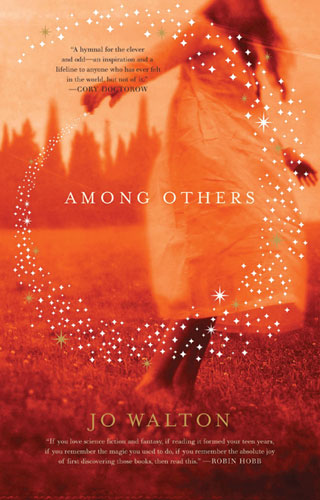
When you have Patrick Nielsen Hayden:
I am not Welsh or female, I do not walk with a cane, and I do not have a dead sibling or a parent who wants me dead. I never attended a boarding school, my family is far-flung and American, and I have never (to the best of my knowledge) conversed with fairies. And yet to a startling extent Among Others feels like a book about the experience of being me when I was, like Mori, fifteen. This turns out to be a fairly common reaction to reading Walton’s novel, at least among the kind of people I tend to know. It is quite possibly the best thing I have ever read about the way people of our ilk, when young, use books and reading to—in the words of Robert Charles Wilson—“light the way out of a difficult childhood.”
Locus reviewer Gary K. Wolfe:
I don’t believe I’ve seen, either in fiction or in memoir, as brilliant and tone-perfect an account of what discovering SF and fantasy can mean to its young readers – citing chapter and verse of actual titles – as in Jo Walton’s remarkable and somewhat autobiographical new novel Among Others.
As Cory Doctorow:
This is one of the places where Walton does something that made my head spin. For though Morwenna’s life has much that makes her unhappy, from her family to her pariah status to her gamey leg, these books are not an escape for her. She dives into them, certainly, and goes away from the world, but she find in them a whole cognitive and philosophical toolkit for unpicking the world, making sense of its inexplicable moving parts, from people to institutions. This isn’t escapism, it’s discovery.
Rave about the same book and with largely the same comments, you pay attention. Not that I needed introduction to Jo Walton, having know her as a fellow fan on Usenet since the mid-nineties and as an excellent science fiction and fantasy writer since her first published novel, The King’s Peace, but such high praise from such distinguished reviewers does concentrate the mind. Amongst Others might just be Jo’s breakthrough book, the novel that moves her from a cult author into a proper success, finally. She has been upping the stakes with every new book: from her start with her three book Histoire à clef series fo Arthurian fantasy, to her reworking of Anthony Trollope with dragons in Tooth and Claw, to one of the most chilling alternate histories in the Small Change series. In each case I had expected her to achieve the same sort of success as somebody like Alastair Reynolds had gotten, but for some reason it never quite happened. Even those alternate history novels, which I had thought would’ve been a surefire hit, well, didn’t quite make it:
Well, actually, Half a Crown is arguably an example of the system not working as well as it might. Farthing did okay midlist numbers in hardcover and actually better-than-expected numbers in mass-market paperback. But for reasons best described as “weather” (i.e., nothing whatsoever to do with the book), Ha’penny took a dip in hardcover–fewer library sales, among other things, if I recall correctly–and the mass-market paperback fell off a cliff. This is why Half a Crown hasn’t had a softcover edition yet–since we were clearly doing something wrong, I didn’t want to spray-paint further lousy numbers onto Jo’s track record.
You do wonder why a great writer like Jo hasn’t been able to catch a break yet — insufficient promotion perhaps, though I’m not sure how much that still matters in this interweb age, or perhaps it’s because she switched genres too much, or not writing in the right subgenre, not writing widescreen space opera or, as Patrick says, it’s just the weather? Good writers can and do bubble under, write books that everybody who finds them loves, but which never quite find their audience. Science fiction is littered with examples (William Barton, T. J. Bass to name but two examples from my own shelves); it would be a shame if the same happened to Jo.
Especially since Among Others does sound incredibly interesting, ever since Jo told of how she grew up in a post-industrial landscape on her Livejournal and people started to tell her to turn it into a novel. She has managed to turn her own experiences discovering science fiction and growing up with it in a world where nobody else cared for it into a proper fantasy novel and while with any other writer I would be wary, Jo has been writing about this online for a long time, ever since we both were regulars on rec.arts.sf.written. She still does so at Tor.com, talking about all her favourite books and what they meant to her and why they’re so good and you should read them — she’s probably the one person who has done the most to nudge me towards books I would not have read otherwise, after S.
Which is why I put my order in for the hardcover at the local science fiction bookstore, which had already sold out of the two copies they had apparantly recieved in November. Eight days I got to wait now, oy.
